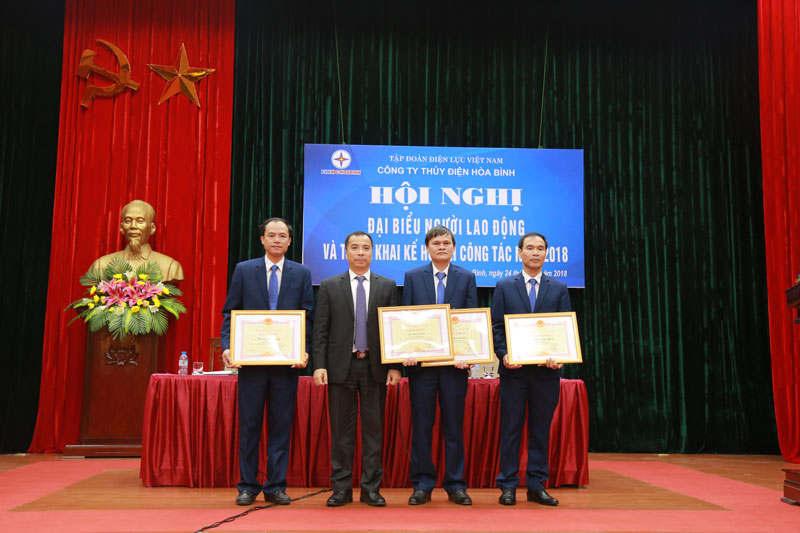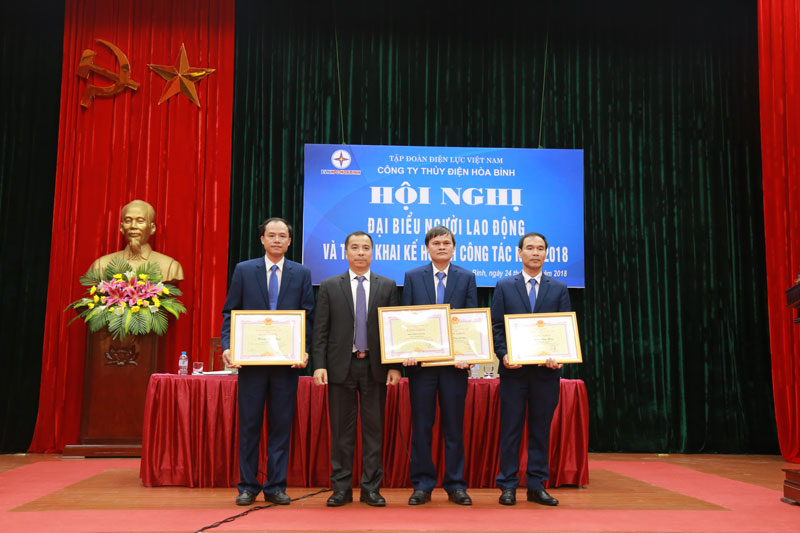
(HBO) – The Hoa Binh Hydropower Company has recently held a conference to review its operation in 2017 and put forward tasks for 2018.
Last year, the company’s electricity output reached over 11.2
million kWh, exceeding 11.8 percent of the yearly target and making a record
high since the plant began operational.

Electricity
of Vietnam grants certificates of merit to many collectives and individuals for
their outstanding performances.
Statistics showed that production costs were nearly 2.5 trillion
VND (109.7 million USD), in which value added tax was valued at 783 billion
VND, natural resources tax 839 billion VND and forest fees 205 billion VND. The
company contributed over 1.4 trillion VND to the province’s budget in 2017.
According to experts, hydrological developments in the year were
abnormal. The water pouring into Hoa Binh lake was 62.4 billion cu.m, exceeding
the average rate for the first time after eight years, with floods happening
from July to October.
During the flood season, the company opened three discharge
courses, with two-three bottom floodgates opened in a total time of 41 days. In
a big flood in October, the company opened eight bottom floodgates with a discharge
output of 16,250 cu.m per second, the biggest since the plant was put into
operation.
Thanks to the good regulation of water, the Hoa Binh hydropower
plant was protected, while no human losses were recorded and asset losses of
people in lower areas were minimised.
However, the company admitted that there remained some production
violations, especially in obeying power safety regulations.
In the year, the plant’s machines had to stop working 26 times due
to breakdowns in their spare parts. The company conducted a lot of major
repairs, with the total value of 401 billion VND.
With the achieved results, many collectives and individuals of the
Hoa Binh Hydropower Company received certificates of merit and noble rewards
from Electricity of Vietnam and ministries and localities.
In 2018, the company strives to operate the plant safely and
effectively, with the total electricity output of 10.1 million kWh, the water
level of Hoa Binh lake reaching 116 metres and the rate of working halt being
0.99 percent./.
According to data from the Hoa Binh Provincial Party Committee, the industrial production index for the first six months of 2025 is estimated to have increased by 20% compared to the same period last year. This marks the highest year-on-year growth rate for this period since 2020.
In the first six months of 2025, Hoa Binh province’s export turnover was estimated at 1.145 billion USD, marking an 18.11% increase compared to the same period in 2024. Import turnover was estimated at $ 804 million, a 17.15% increase, which helped the province maintain a positive trade balance.
The lives of the ethnic minority farmers in Tan Lac district have gradually improved thanks to the new directions in agricultural production. This is a testament to the collective strength fostered through the professional associations and groups implemented by various levels of the district’s Farmers’ Union.
With the motto the "product quality comes first,” after nearly one year of establishment and operation, Muong village’s Clean Food Agricultural and Commercial Cooperative, located in Cau Hamlet, Hung Son Commune (Kim Boi district), has launched reputable, high-quality agricultural products to the market that are well-received by consumers. The products such as Muong village’s pork sausage, salt-cured chicken, and salt-cured pork hocks have gradually carved out a place in the market and they are on the path to obtaining the OCOP certification.
In the past, the phrase "bumper harvest, rock-bottom prices" was a familiar refrain for Vietnamese farmers engaged in fragmented, small-scale agriculture. But today, a new spirit is emerging across rural areas of Hoa Binh province - one of collaboration, organisation, and collective economic models that provide a stable foundation for production.
Maintaining growing area codes and packing facility codes in accordance with regulations is a mandatory requirement for agricultural products to be eligible for export. Recently, the Department of Agriculture and Environment of Hoa Binh province has intensified technical supervision of designated farming areas and packing facilities to safeguard the "green passport" that enables its products to access international markets.



